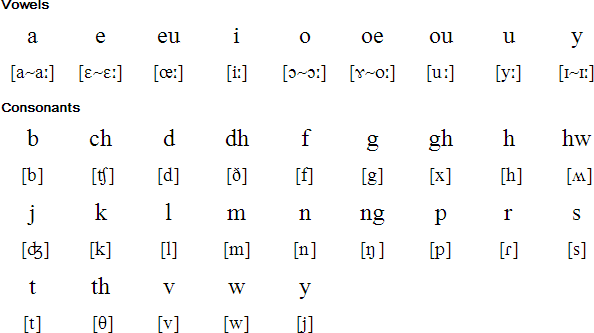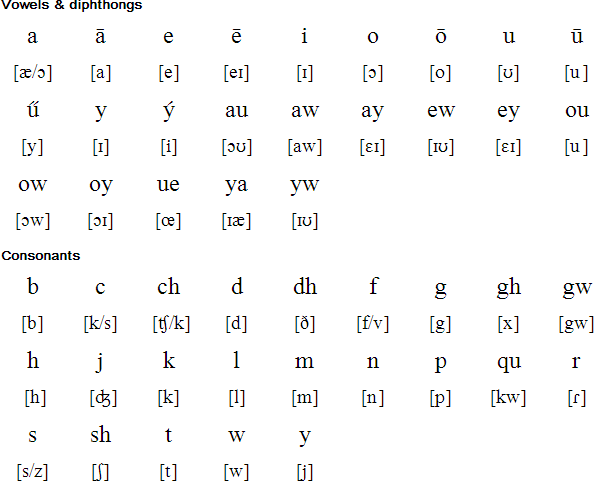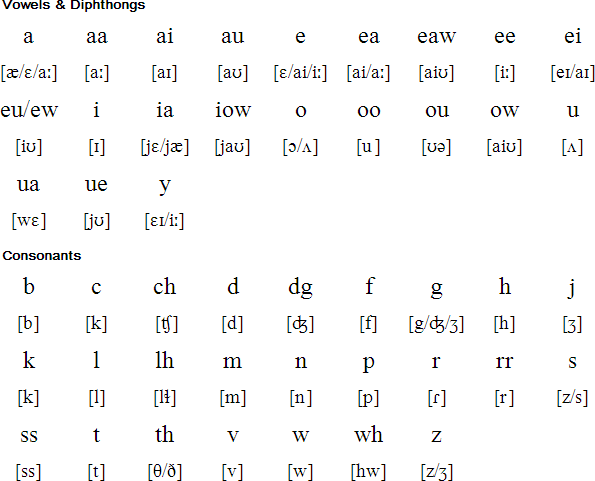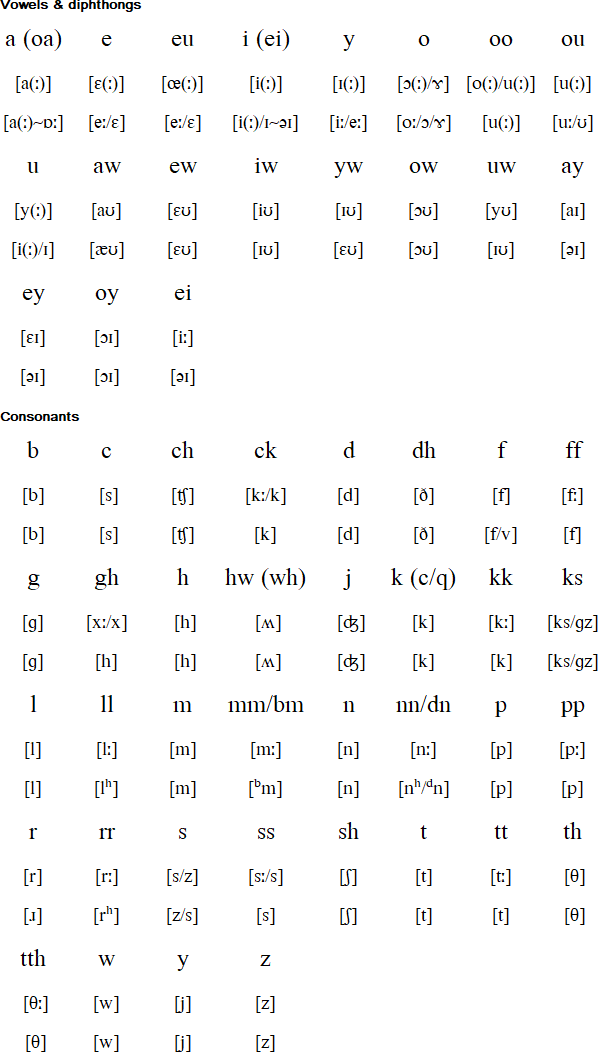Cornish is a Celtic language and a member of the Brythonic or Brittonic branch of the Insular Celtic language family, along with Welsh and Breton. It was spoken as a community language in Cornwall until the late 18th century, and a few people continued to speak it into the 19th century. Efforts to revive the language began in the early 20th century [see below].
History of Cornish | Last speakers | Revival | Current Status | Names of the language | Relationship to other languages | Alphabet and pronunciation | Sample texts and videos | Links
Cornish started to diverge from Welsh towards the end of the 7th century AD and the earliest known examples of written Cornish date from the end of the 9th century AD. These were in the form of glosses scribbled in the margins of a Latin text - Smaragdus' Commentary on Donatus. They were originally thought to be in Old Breton, but Prof. J. Loth showed in 1907 that they were in fact Old Cornish. Old Breton and Old Cornish were very similar and are easily confused.
Old Cornish was used from about 800-1250 AD and traces of it also survive in some place names in eastern Cornwall. The Cornish used between 1250 and 1550 is known as Middle or Medieval Cornish and quite a lot of literature from this period still survives, including religious plays, poems and sermons.
Literature in Late or Modern Cornish, the type of Cornish used between 1550 and the 19th century, includes folk tales, poems, songs, and translations from the Bible.
[top]
Dorothy or Dolly Pentreath (1692-1777) is known as the last fluent, native speaker of Cornish. She claimed that she spoke nothing but Cornish until she was 20, although it is not certain whether this was true. She was a native speaker of Cornish, and was known to swear fluently in the language. Whether she spoke Cornish fluently later in life is disbuted [source].
In 1776 Daines Barrington (1727-1800), an English lawyer, antiquary and naturalist, received a letter in Cornish and English from William Bodinar, a fisherman from Mousehole, who claimed that he knew at least five people who speak Cornish in Mousehole. He also mentioned another Cornish speak in Marazion - John Nancarrow, who died in the 1790s.
Cornish continued to be spoken during the 19th century by a small number of individuals. The last known speaker of traditional Cornish was John Mann, who died in 1914.
Many Cornish words and some phrases continued to be used in the Anglo-Cornish dialect into the 20th century, especially in western parts of Cornwall.
More information about the last speakers of Cornish
https://en.wikipedia.org/wiki/Last_speaker_of_the_Cornish_language
[top]
Henry Jenner (1848-1934) was the first person to try to revive the language. His interest was sparked by the discovery of a number of lines from a medieval Cornish play in a 14th century manuscript in the British Museum. Jenner spent many years travelling all over Cornwall interviewing Cornish speakers, learning Cornish from them and studying any Cornish texts he could find. Then in 1904 he published a Handbook of the Cornish language, an introductory textbook for people interested in learning the language. Jenner also learned to speak Breton and was surprised by the many similarities between the two languages.
Jenner's work was continued by Robert Morton Nance (1873-1959), who reconstructed a version of Cornish he called Unified Cornish (Kernewek Unys) based on Medieval miracle plays and borrowing words from the middle and late periods and even from Welsh and Breton. Nance also devised his own spelling system. In 1929 Nance published his work in a book called Cornish for All.
In 1967 the Cornish Language Board (Kevas an taves Kernewek) was set up to promote the language. The version of the language they promoted was Unified Cornish and their efforts attracted considerable interest. During the 1980s as an increasing number of people became interested in Cornish, they started to notice the inaccuracies and shortcomings of Unified Cornish. After the publication in 1984 of Professor Glanville Price's book The Languages of Britain, which severely criticised Unified Cornish, Celtic scholars and linguists decided that they couldn't take the language seriously any more and the Cornish Language Board had to find an alternative. They decided to adopt a new version of Cornish devised by Dr Ken George.
George's system was originally known as Phonemic Cornish and is now called Common Cornish (Kernewek Kemmyn). He based it on Medieval cornish manuscripts and used a computer to analyse the pronunciation. His spelling system was so different to those used for other versions of the language that it meet with fierce opposition among supporters of Cornish and academics.
In the early 1980s, a version of Cornish based on Late/Modern Cornish and known as Modern Cornish (Curnoack Nowedga) was reconstructed by a group of Cornish enthusiasts led by Richard Gendall. In 1986 they set up the Cornish Language Council (Cussel an Tavas Kernôwek) to promote Modern Cornish and to encourage the study of Cornish from all periods.
In 1995, the Celtic scholar Nicholas Williams devised a new version of Unified Cornish known as Unified Cornish Revised or UCR (Kernowek Unys Amendys) which addressed some of the shortcomings of Unified Cornish. UCR modifies the standard spelling in order to indicate the reconstructed phonology in light of current scholarship, while keeping to the traditional orthographic practices of the medieval scribes. It also makes full use of the Late Cornish prose materials unavailable to Nance, taking advantage of the same fluent, natural style that made Gendall's Modern Cornish appeal to many. Williams published a English-Cornish Dictionary in this orthography in 2000.
The most popular versions of Cornish are currently Common Cornish and UCR, though other versions also have supporters. The differences between the various versions of Cornish are not huge and do not prevent speakers from communicating with one another.
After much discussion, a Standard Written Form (SWF) of Cornish, or Furv Skrifys Savonek, was agreed on in 2008 by the main Cornish language groups: Kesva an Taves Kernewek, Kowerthas an Yeth Kernewek, Agan Tavas and Cussel an Tavas Kernôwek. The SWF is intended for official use and for formal education. It was adopted by the Gorsedh Kernow in 2009, and a few minor changes were made in 2013. In other contexts people are free to choose the form of written Cornish they prefer.
More information about the Standard Written Form of Cornish
https://en.wikipedia.org/wiki/Standard_Written_Form
[top]
There are currently an estimated 3,000 speakers of Cornish, 2,000 of whom claim fluency, according to a survey commissioned by the Cornish Language Strategy project in 2008. In the 2011 UK census 600 people in England and Wales declared Cornish as their main language: 500 in Cornwall, and the rest elsewhere [source].
Some families are now bringing up their children with Cornish as their first language. Cornish names are popular for children, pets, houses and boats. People are writing and performing songs and poetry in Cornish, and the language is taught in some schools and at the University of Exeter.
There are a number of magazines solely in Cornish: An Gannas, An Gowser and An Garrick. BBC Radio Cornwall have regular news broadcasts in Cornish, and sometimes have other programmes and features for learners and enthusiasts. Local newspapers, such as the Western Morning News, often have articles in Cornish, and such newspapers as The Packet, The West Briton and The Cornishman also support the language. The first ever feature film entirely in Cornish, Hwerow Hweg (Bitter Sweet) was released in 2002, and a number of other films in Cornish have been made since then.
In 2010 a bilingual Cornish/English creche or Skol dy’Sadorn Kernewek (Cornish Saturday School) was set up. The group is held on Saturdays at the Cornwall College in Cambourne and children between 2 and 5 years old are attending. The children are immersed in Cornish in one room, and their parents learn Cornish in another. The Cornish lessons for the parents focus particularly on language they can use with their children.
[top]
There are several different versions of revived Cornish, each of has a different name. Here is a summary:
More details:
https://en.wikipedia.org/wiki/Unified_Cornish
http://moderncornish.net/
https://en.wikipedia.org/wiki/Kernewek_Kemmyn
https://en.wikipedia.org/wiki/Kernowek_Standard
https://en.wikipedia.org/wiki/Standard_Written_Form
[top]
Cornish is closely related to Breton, and mutually intelligible with it, to some extent. It is also closely related to Welsh, though there is only limited mutually intelligibility between them. Cornish is more distantly related to Irish, Manx and Scottish Gaelic.
[top]
| A a | B b | Ch ch | D d | E e | F f | G g | H h |
|---|---|---|---|---|---|---|---|
| a | be | cha | de | e | ev | ge | ha |
| I i | J j | K k | L l | M m | N n | O o | P p |
| i | je | ka | el | em | en | o | pe |
| R r | S s | T t | U u | V v | W w | Y y | |
| er | es | te | u | ve | we | ye |



The first row of IPA transcriptions are used for varieties of Cornish based on Medieval Cornish, such as Kernewek Kemmyn, and the transcriptions in the second row are used for forms of Cornish based on Late Cornish, i.e. Curnoack Nowedga. There is some variation in the letters used in some cases.

Source: http://www.magakernow.org.uk/index.aspx?articleid=38861
There are four different ways initial consonants can mutate in Cornish.
| Unmutated consonant | Soft mutation | Aspirate mutation | Hard mutation | Mixed mutation |
|---|---|---|---|---|
| p | b | f | - | - |
| t | d | th | - | - |
| k | g | h | - | - |
| b | v | - | p | f |
| d | dh | - | t | t |
| g1 | disappears | - | k | wh |
| g2 | w | - | k | wh |
| gw | w | - | kw | wh |
| m | v | - | - | f |
| ch | j | - | - | - |
Download alphabet charts for Cornish (Excel)
[top]
Yma pub den genys frank hag equal yn dynyta hag yn gwyryow. Ymons y enduys gans reson ha keskans hag y tal dhedhans omdhon an eyl orth y gela yn sperys a vredereth.
Pub den oll yw genys rydh hag kehaval yn dynita ha gwiryow. Yth yns i kemynnys gans reson ha kowses hag y tal dhedha gul dhe unn orth y gila yn spyrys a vrederedh.
All human beings are born free and equal in dignity and rights. They
are endowed with reason and conscience and should act towards one another
in a spirit of brotherhood.
(Article 1 of the Universal Declaration of Human Rights)
Information about Cornish | Phrases | Numbers: Revived Cornish, Middle Cornish | Colours | Family words | Terms of endearment | Colours | Time | Weather words | Comparison of Celtic languages | Celtic cognates | Celtiadur | Tower of Babel | My podcast about Cornish | Cornish courses on: Amazon.com and Amazon.co.uk [affilate links]
[top]
Information about the Cornish language
https://en.wikipedia.org/wiki/Cornish_language
http://www.agantavas.com
http://www.cornish-language.org
http://www.kernewegva.com
https://www.facebook.com/magakernow
Cornish lessons
http://www.learncornishnow.com
http://www.bbc.co.uk/cornwall/connected/stories/new_cornwall_language.shtml
https://www.memrise.com/course/1569471/go-cornish-1/
Breton, Celtiberian, Cornish, Cumbric, Gaulish, Irish, Lepontic, Lusitanian, Manx, Scottish Gaelic, Welsh
Languages written with the Latin alphabet
[top]
Page last modified: 26.09.21
[top]
You can support this site by Buying Me A Coffee, and if you like what you see on this page, you can use the buttons below to share it with people you know.

If you like this site and find it useful, you can support it by making a donation via PayPal or Patreon, or by contributing in other ways. Omniglot is how I make my living.
Note: all links on this site to Amazon.com, Amazon.co.uk
and Amazon.fr
are affiliate links. This means I earn a commission if you click on any of them and buy something. So by clicking on these links you can help to support this site.
[top]